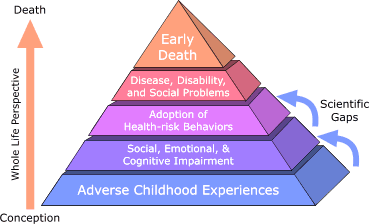SEARCH:
FOLLOW ME:
SUBSCRIBE TO MY BLOG:
THE ACE STUDY

The Adverse Childhood Experiences (ACE) Study showed that for 17,337 patients, childhood trauma correlated to serious adult medical conditions. “Contrary to conventional belief," says co-Director Vincent Felitti, MD, "time does not heal all wounds, since humans convert traumatic emotional experiences in childhood into organic disease later in life.”FEATURED BOOKS – QUOTES
"Too many Americans are spurred to achieve, rather than to attach."
--A General Theory of Love "Trying to fix the heart using the head, is like trying to paint with a hammer - it only makes a mess."
"You can be strong - or you can be human." -- Grief Recovery Handbook "Gosh, I shoulda checked the milligramage! Oh, well, Live and Learn." -- Working Girl "Any book you haven't thrown across the room at least once because it smashed your world view, probably isn't worth a long shelf life." -- Kathy "Mental health. For everything else there's MasterCard." -- Kathy-
RECENT POSTS
- Singing for Joy after Trauma: My Music Video! May 17, 2018
- Parenting as We Were Parented May 10, 2018
- I had a blast: “Mary Giuliani LIVE!” Apr 18 April 17, 2018
- My Book’s Amazon Reviews: Music & Healing April 3, 2018
- Six-City Bus Tour: Campaign to Heal Childhood Trauma March 23, 2018
RECENT COMMENTS
- Paula Kinghorn on Featured Topics
- Saria bushmire on Find a Support Group
- whoiscall on Singing for Joy after Trauma: My Music Video!
- deen on Blogs
- Lin Rhodes on Featured Topics
ARCHIVES
Tag Archives: PTSD
What is EMDR – and Why is it So Effective?
CLICK to BUY “Don’t Try This Alone” “During REM sleep, the brain is attempting to process survival information until it’s resolved“–Dr. Francine Shapiro (above). Eye Motion Desensitization and Reprocessing (EMDR) is a potent trauma treatment developed by Dr. Francine Shapiro, … Continue reading →
![]()
Posted in Brain Science, Dissociation, Emotional pain, Grief
|
Tagged Adult Attachment Disorder, Adult Attachment Interview, Adult Attachment Theory, Bessel van der Kolk, brain science, Developmental Trauma, EMDR, Emotional pain, Francine Shapiro, Incident Trauma, Mindfulness, PTSD, REM Sleep
|
13 Comments
Readers Defend Van der Kolk
I had the most comments ever last week, as readers spoke up to defend Dr. Bessel van der Kolk (left) and his ideas about somatic (body) healing for trauma, after the sideswipes against science by the New York Times May … Continue reading →
![]()
Posted in Attachment Theory, Brain Science, Dissociation, Emotional pain
|
Tagged Adult Attachment Disorder, Adult Attachment Interview, Adult Attachment Theory, Attachment Theory, Bessel van der Kolk, brain science, Brain stem, Child Trauma, EMDR, Frontal Cortex, New York Times, PTSD
|
Leave a comment
In Defense of Van der Kolk
The New York Times May 22 spotlighted Dr. Bessel van der Kolk MD’s idea that to change the way we heal a traumatized mind, start with the body (as noted last week). (Van der Kolk portrait by Matthew Woodson for … Continue reading →
![]()
Posted in Attachment Disorder, Attachment Theory, Brain Science, Emotional pain
|
Tagged Adult Attachment Disorder, Adult Attachment Interview, Adult Attachment Theory, Attachment Theory, Bessel van der Kolk, brain science, Brain stem, Child Trauma, EMDR, Frontal Cortex, New York Times, PTSD
|
12 Comments
“Heal trauma? Start with the body”
“Bessel van der Kolk wants to change the way we heal a traumatized mind — by starting with the body,” reports Jeneen Interlandi in the New York Times Magazine May 22. (Dr. van der Kolk in session drawn by Matthew … Continue reading →
![]()
I Oughtta Have My Head…
#11 in my ongoing book blogs from “Don’t Try This at Home” After my divorce and the saga with Rebound Dan back East, did I mention dating in California? I did meet several fellows who looked promising at first. Harvey … Continue reading →
![]()
Posted in Attachment, Attachment Disorder, Brain Science, Divorce, Emotional pain, Grief
|
Tagged Attachment, attachment disorder, brain science, codependent, Divorce, Emotional pain, Grief, Limbic brain, post-divorce dating, PTSD, rebound, repetition compulsion, therapy, trauma
|
7 Comments

